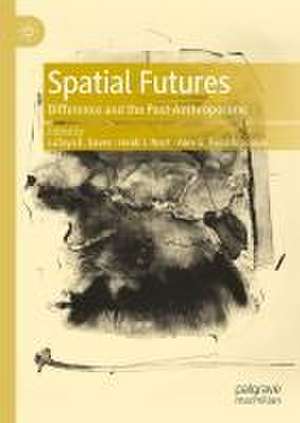Spatial Futures : Difference and the Post-Anthropocene
Editat de LaToya E. Eaves, Heidi J. Nast, Alex G. Papadopoulosen Limba Engleză Hardback – 12 mai 2024
Preț: 880.87 lei
Preț vechi: 967.98 lei
-9% Nou
Puncte Express: 1321
Preț estimativ în valută:
168.56€ • 176.79$ • 140.32£
168.56€ • 176.79$ • 140.32£
Carte tipărită la comandă
Livrare economică 28 martie-03 aprilie
Preluare comenzi: 021 569.72.76
Specificații
ISBN-13: 9789819997602
ISBN-10: 9819997607
Ilustrații: XXXV, 562 p. 34 illus., 7 illus. in color.
Dimensiuni: 148 x 210 mm
Greutate: 0.86 kg
Ediția:2024
Editura: Springer Nature Singapore
Colecția Palgrave Macmillan
Locul publicării:Singapore, Singapore
ISBN-10: 9819997607
Ilustrații: XXXV, 562 p. 34 illus., 7 illus. in color.
Dimensiuni: 148 x 210 mm
Greutate: 0.86 kg
Ediția:2024
Editura: Springer Nature Singapore
Colecția Palgrave Macmillan
Locul publicării:Singapore, Singapore
Cuprins
Introduction.- I. Relational ontology, death, and the maternal.- Part One. The maternal ≠ {Mother + Child}: Relational ontology and the mattering of Black lives (Planetary pasts).- Part two: The maternal ≠ {Mother + Child}: Relational ontology and the mattering of Black lives (Planetary futures).- The BlackSpace Manifesto: ‘Living’ Black liberatory futures.- Remaindered Commons: Notes towards post-socialist futures in China vis-à-vis the Black Outdoors.- The necromancy of derivative violence: Finance capitalism, planetary pandemics, and speculative wagers on death in the Anthropocene.- II. How I Got Over: On Black Tomorrows.- “Symbols AND systems!” The Take ‘Em Down, NOLA’s decolonial approach to memory work”.- Rewriting the world: Climate fiction, Black future-space making, and the speculative project of justice.- Critical engagement into GIS methods while wrestling with slavery’s archive.- III. Sovereignty in the Capitalocene as the crucible of difference in the post-Anthropocene.- Algorithmic finance and the anthropogenic environmental crisis in “accelerando”: Science of finance capital as catalyst of climate change.- The Tourismocene: Barcelona, overtourism, and the spatial futures of the polis.- Environmental futures and urbanity entangled in nuclear legacies in the Baltic Sea coastal towns of Paldiski and Sillamäe.- Transmotion in the folkhem: Automobility, epistemicide, and the post-Anthropocene.- IV Speculative futures as a lens for “staying human in the cataclysm.”.- But that’s just mad! Reading the utopian impulse in Dark princess and Black empire.- Troubling the anthropos in the post-Anthropocene: Liu Cixin’s Three-Body trilogy.- Smart and cruel. Cities in the thrall of artificial intelligence in the fiction of William Gibson and Cory Doctorow.
Notă biografică
LaToya E. Eaves, PhD, Associate Professor of Geography, University of Tennessee, Knoxville, is a scholar of Black geographies. Her research emphasizes questions of power, non-essentialism and embodiment, centering Blackness, gender, Black feminism, and the U.S. South.
Heidi J. Nast, PhD, Professor of International Studies, DePaul University, is interested in how difference evolutionarily, culturally, and ontologically unfolds and operates across worlds and psyches, the power that difference serves, and the difference that power makes.
Alex G. Papadopoulos, PhD, Professor of Geography, DePaul University. An urban and political geographer, his specialties range from geopolitics and applied diplomacy, to heritage studies, regional analysis, and LGBTIQ+ studies.
Heidi J. Nast, PhD, Professor of International Studies, DePaul University, is interested in how difference evolutionarily, culturally, and ontologically unfolds and operates across worlds and psyches, the power that difference serves, and the difference that power makes.
Alex G. Papadopoulos, PhD, Professor of Geography, DePaul University. An urban and political geographer, his specialties range from geopolitics and applied diplomacy, to heritage studies, regional analysis, and LGBTIQ+ studies.
Textul de pe ultima copertă
Spatial Futures invites readers to imagine power and freedom through the lens of the ‘Black Outdoors’, a transdisciplinary spatial concept that operates beyond the planetary, stratigraphic confines of the ‘Anthropocene’. The chapters collectively point to the ontological-epistemological contradictions involved in forging liberatory spatial futures. Bringing new spatial imaginaries to bear in and outside geography, the book refuses the strictures of the ‘cenic’, entertaining difference as world-making.
Caracteristici
Establishes multidisciplinary alliances that will be necessary in the post-Anthropocene Makes bold use of future worlds literatures and dystopian speculative fiction Brings multiple perspectives by scholars from a range of interdisciplinary fields
